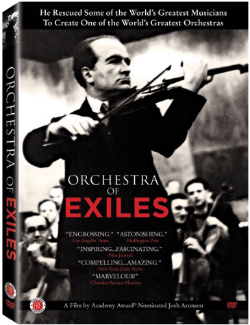 Orchestra of Exiles (2012)
Orchestra of Exiles (2012)
Director Josh Aronson
Aronson Films Production, 85 minutes
www.pbs.org/wnet/orchestra-of-exiles
(also available from other sources, including Amazon and Netflix)
In 1993, Steven Spielberg brought the heroism of Oskar Schindler to the attention of the world through an Oscar-winning film that educated a generation about Schindler’s efforts to save the lives of over 1,200 Jews from the Holocaust.
Orchestra of Exiles tells the account of another astonishingly brave person, the violinist Bronislaw Huberman, who saved the lives of as many as 1,000 of the greatest musicians of Europe during the rise of Nazism in the 1930s through the creation of the Palestine Symphony.
The film tells the story of Huberman’s meteoric rise as an eminent soloist, even performing the Brahms’s concerto in front of the composer himself. But such success was also a heavy burden for the politically thoughtful and humanitarian-minded prodigy. With a prophetic wisdom, he was able to see a future that many musicians did not, and he understood that Nazism was not a passing phase. He knew the only chance of survival was escape.
At a great sacrifice to his own career, he devoted all of his resources to creating the Palestine Symphony, raising funds by staging exhausting recital tours that capitalized on his fame. At the same time, he was auditioning the greatest Jewish musicians of the orchestras of Europe and enticing them to move to Palestine.
As a soloist, Huberman’s greatest success had come in Berlin, but as Hitler gained power throughout the early 1930s, Huberman refused the pleas of Berlin Philharmonic music director Wilhelm Furtwangler to return. Huberman was joined by others who took a stand against Nazism, most notably Arturo Toscanini (at the time the most famous musician in the world).
Furtwangler insisted he opposed the Nazis, yet he continued to conduct for Hitler, hoping to preserve his great orchestra and save his beloved musicians. But gradually, the Jewish musicians of the Berlin Philharmonic disappeared as Hitler gained more power and Goebbels gained control as propaganda minister.
Many Jewish musicians stayed in Germany, performing in the Jüdischer Kulturbund where Jews were permitted to perform for other Jews. Many thought the Kulturbund would save them, but eventually it was outlawed, and many of these artists were murdered in the Holocaust.
Huberman’s great dream of a world class orchestra in Palestine saved many other musicians. The Palestine Symphony, which would be renamed the Israel Philharmonic upon the creation of the state of Israel, played its premiere concert in 1936. Toscanini himself led the first performances, conducting Brahms Second Symphony (which had been pre-rehearsed by William Steinberg, later to become music director of the Boston Symphony.)
The Palestine Symphony was much more than just an orchestra; it was the salvation of human life and the preservation of a culture. By touring widely, and through a close association with Leonard Bernstein, the Israel Philharmonic became one of the most famous orchestras in the world.
But it was the vision of one great man that built this orchestra out of sand, and his sacrifices were overwhelming. On an exhausting concert tour of America to raise money for the new orchestra, his beloved Stradivarius was stolen from the dressing room at Carnegie Hall. He would never see the violin again, and it would not be returned to the world for 50 years. The Huberman Stradivarius is now played by Joshua Bell.
This film serves to remind musicians of the effect our music can have in the world. At a time when we spend so much of our day resisting a seemingly endless onslaught of negativity that tries our souls as we fight for inspiration, the story of Huberman and the founding of the Palestine Symphony should be more well-known. Huberman overcame seemingly insurmountable obstacles, including the dehumanization of an entire people, to achieve a dream by believing in humanity.





